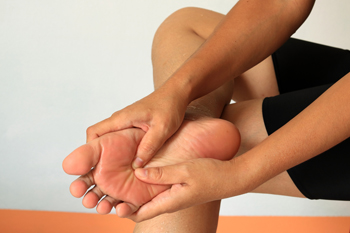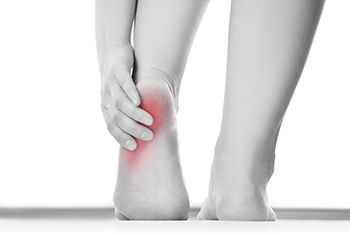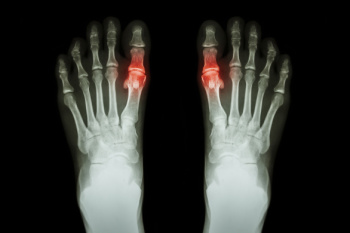Items filtered by date: May 2024
Advanced MLS Laser Therapy for Heel Pain
Complications of Peripheral Neuropathy
 Peripheral neuropathy results from damage to the peripheral nerves, which are responsible for sending information from the brain and spinal cord to the rest of the body. This condition often results in tingling, numbness, and pain in the affected areas, typically the hands and feet. Due to high blood sugar levels common in diabetes, people with this disease are more prone to peripheral neuropathy and the associated lack of sensation in the feet. This loss of feeling means that injuries, pressure sores, or other foot problems may go unnoticed. Without prompt and proper care, such untreated injuries can develop into diabetic foot ulcers, serious wounds that heal very slowly due to impaired circulation. If these ulcers become infected and treatment is not working, the ulcer can progress to gangrene, which involves the death of body tissue. This sometimes necessitates amputation to prevent further health complications. Regular check-ups with a podiatrist, or foot doctor, can help manage peripheral neuropathy and prevent severe complications. If you have peripheral neuropathy, it is suggested that you add a podiatrist to your regular care team.
Peripheral neuropathy results from damage to the peripheral nerves, which are responsible for sending information from the brain and spinal cord to the rest of the body. This condition often results in tingling, numbness, and pain in the affected areas, typically the hands and feet. Due to high blood sugar levels common in diabetes, people with this disease are more prone to peripheral neuropathy and the associated lack of sensation in the feet. This loss of feeling means that injuries, pressure sores, or other foot problems may go unnoticed. Without prompt and proper care, such untreated injuries can develop into diabetic foot ulcers, serious wounds that heal very slowly due to impaired circulation. If these ulcers become infected and treatment is not working, the ulcer can progress to gangrene, which involves the death of body tissue. This sometimes necessitates amputation to prevent further health complications. Regular check-ups with a podiatrist, or foot doctor, can help manage peripheral neuropathy and prevent severe complications. If you have peripheral neuropathy, it is suggested that you add a podiatrist to your regular care team.
Neuropathy
Neuropathy can be a potentially serious condition, especially if it is left undiagnosed. If you have any concerns that you may be experiencing nerve loss in your feet, consult with one of our podiatrists from Nashville Family Foot Care. Our practitioners will assess your condition and provide you with quality foot and ankle treatment for neuropathy.
What Is Neuropathy?
Neuropathy is a condition that leads to damage to the nerves in the body. Peripheral neuropathy, or neuropathy that affects your peripheral nervous system, usually occurs in the feet. Neuropathy can be triggered by a number of different causes. Such causes include diabetes, infections, cancers, disorders, and toxic substances.
Symptoms of Neuropathy Include:
- Numbness
- Sensation loss
- Prickling and tingling sensations
- Throbbing, freezing, burning pains
- Muscle weakness
Those with diabetes are at serious risk due to being unable to feel an ulcer on their feet. Diabetics usually also suffer from poor blood circulation. This can lead to the wound not healing, infections occurring, and the limb may have to be amputated.
Treatment
To treat neuropathy in the foot, podiatrists will first diagnose the cause of the neuropathy. Figuring out the underlying cause of the neuropathy will allow the podiatrist to prescribe the best treatment, whether it be caused by diabetes, toxic substance exposure, infection, etc. If the nerve has not died, then it’s possible that sensation may be able to return to the foot.
Pain medication may be issued for pain. Electrical nerve stimulation can be used to stimulate nerves. If the neuropathy is caused from pressure on the nerves, then surgery may be necessary.
If you have any questions, please feel free to contact our office located in Nashville, TN . We offer the newest diagnostic and treatment technologies for all your foot care needs.
Managing Heel Pain

Heel pain, a common foot ailment, can significantly impact mobility and daily activities. Typically located on the underside or back of the heel, it can stem from various causes, including plantar fasciitis, Achilles tendinitis, heel spurs, or stress fractures. One prevalent reason for morning discomfort is the tightening of the plantar fascia ligament during sleep, leading to a sharp pain upon first steps. However, not all heel pains are alike. Pain can manifest in different areas such as the bottom, sides, or back of the heel, each indicating distinct issues. Ignoring persistent discomfort may exacerbate the condition and hinder natural healing processes. Fortunately, several remedies exist, including rest, stretching exercises, proper footwear, and custom orthotics. If you have persistent heel pain, it is suggested that you make an appointment with a podiatrist for an accurate diagnosis and tailored treatment plan.
Many people suffer from bouts of heel pain. For more information, contact one of our podiatrists of Nashville Family Foot Care. Our practitioners can provide the care you need to keep you pain-free and on your feet.
Causes of Heel Pain
Heel pain is often associated with plantar fasciitis. The plantar fascia is a band of tissues that extends along the bottom of the foot. A rip or tear in this ligament can cause inflammation of the tissue.
Achilles tendonitis is another cause of heel pain. Inflammation of the Achilles tendon will cause pain from fractures and muscle tearing. Lack of flexibility is also another symptom.
Heel spurs are another cause of pain. When the tissues of the plantar fascia undergo a great deal of stress, it can lead to ligament separation from the heel bone, causing heel spurs.
Why Might Heel Pain Occur?
- Wearing ill-fitting shoes
- Wearing non-supportive shoes
- Weight change
- Excessive running
Treatments
Heel pain should be treated as soon as possible for immediate results. Keeping your feet in a stress-free environment will help. If you suffer from Achilles tendonitis or plantar fasciitis, applying ice will reduce the swelling. Stretching before an exercise like running will help the muscles. Using all these tips will help make heel pain a condition of the past.
If you have any questions please contact our office located in Nashville, TN . We offer the newest diagnostic and treatment technologies for all your foot and ankle needs.
A Guide to Diagnosing Gout

Gout, a form of inflammatory arthritis, can be excruciating, often affecting the big toe and ankles. Recognizing its symptoms is vital for timely management. The diagnosis begins with a keen observation of the symptoms, which are often sudden, intense joint pain, swelling, redness, and warmth, typically striking at night or in the early hours. The affected joint might feel tender to the touch, making even the lightest pressure unbearable. An accurate diagnosis often involves a comprehensive medical history review and a physical examination by a podiatrist. They may also conduct tests like joint fluid analysis to detect urate crystals, which are consistent with gout. Blood tests measuring uric acid levels can aid in confirmation, although high levels do not always guarantee a diagnosis. Imaging tests, such as X-rays, may reveal joint damage in chronic cases. If you have pain in the top of your foot, with a focus on the big toe, it is strongly suggested that you contact a podiatrist who can effectively treat gout.
Gout is a painful condition that can be treated. If you are seeking treatment, contact one of our podiatrists from Nashville Family Foot Care. Our practitioners will treat your foot and ankle needs.
What Is Gout?
Gout is a form of arthritis that is characterized by sudden, severe attacks of pain, redness, and tenderness in the joints. The condition usually affects the joint at the base of the big toe. A gout attack can occur at any random time, such as the middle of the night while you are asleep.
Symptoms
- Intense Joint Pain - Usually around the large joint of your big toe, and it most severe within the first four to twelve hours
- Lingering Discomfort - Joint discomfort may last from a few days to a few weeks
- Inflammation and Redness -Affected joints may become swollen, tender, warm and red
- Limited Range of Motion - May experience a decrease in joint mobility
Risk Factors
- Genetics - If family members have gout, you’re more likely to have it
- Medications - Diuretic medications can raise uric acid levels
- Gender/Age - Gout is more common in men until the age of 60. It is believed that estrogen protects women until that point
- Diet - Eating red meat and shellfish increases your risk
- Alcohol - Having more than two alcoholic drinks per day increases your risk
- Obesity - Obese people are at a higher risk for gout
Prior to visiting your podiatrist to receive treatment for gout, there are a few things you should do beforehand. If you have gout you should write down your symptoms--including when they started and how often you experience them, important medical information you may have, and any questions you may have. Writing down these three things will help your podiatrist in assessing your specific situation so that he or she may provide the best route of treatment for you.
If you have any questions, please feel free to contact our office located in Nashville, TN . We offer the newest diagnostic and treatment technologies for all your foot care needs.
Foot Pain During Pregnancy
 Pregnancy often brings about foot pain and lower limb changes due to increased weight and altered body mechanics as the baby grows. These changes can lead to swelling, varicose veins, and changes in foot structure. A common issue is flattened arches, which may cause pain and discomfort. Supportive and comfortable footwear, avoiding standing for prolonged periods, and elevating feet to reduce swelling are suggested to alleviate symptoms. Compression stockings can also help manage swelling and prevent varicose veins. Gentle exercise, like walking or swimming, can improve circulation and reduce leg cramps. Consulting with a podiatrist, or foot doctor, is important to get targeted treatment advice. Podiatrists can also prescribe orthotics or specific exercises to strengthen the feet and legs during pregnancy. If you are pregnant and struggling with foot pain, it is suggested that you consult a podiatrist for treatment options.
Pregnancy often brings about foot pain and lower limb changes due to increased weight and altered body mechanics as the baby grows. These changes can lead to swelling, varicose veins, and changes in foot structure. A common issue is flattened arches, which may cause pain and discomfort. Supportive and comfortable footwear, avoiding standing for prolonged periods, and elevating feet to reduce swelling are suggested to alleviate symptoms. Compression stockings can also help manage swelling and prevent varicose veins. Gentle exercise, like walking or swimming, can improve circulation and reduce leg cramps. Consulting with a podiatrist, or foot doctor, is important to get targeted treatment advice. Podiatrists can also prescribe orthotics or specific exercises to strengthen the feet and legs during pregnancy. If you are pregnant and struggling with foot pain, it is suggested that you consult a podiatrist for treatment options.
Pregnant women with swollen feet can be treated with a variety of different methods that are readily available. For more information about other cures for swollen feet during pregnancy, consult with one of our podiatrists from Nashville Family Foot Care. Our practitioners will attend to all of your foot and ankle needs.
What Foot Problems Can Arise During Pregnancy?
One problem that can occur is overpronation, which occurs when the arch of the foot flattens and tends to roll inward. This can cause pain and discomfort in your heels while you’re walking or even just standing up, trying to support your baby.
Another problem is edema, or swelling in the extremities. This often affects the feet during pregnancy but tends to occur in the later stages.
How Can I Keep My Feet Healthy During Pregnancy?
- Wearing orthotics can provide extra support for the feet and help distribute weight evenly
- Minimize the amount of time spent walking barefoot
- Wear shoes with good arch support
- Wear shoes that allow for good circulation to the feet
- Elevate feet if you experience swelling
- Massage your feet
- Get regular, light exercise, such as walking, to promote blood circulation to the feet
If you have any questions please feel free to contact our office located in Nashville, TN . We offer the newest diagnostic and treatment technologies for all your foot and ankle needs.

